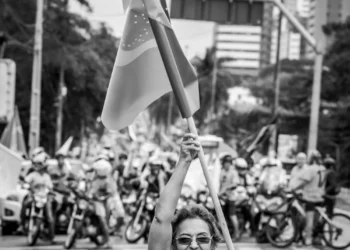by Helena Vetorazo
Reviewed by Matheus Lucas Hebling
The 2022 edition of the Program for International Student Assessment (PISA) revealed concerning declines in educational performance in Brazil, particularly in mathematics, reading, and science. While the media, supported by some experts, associates these difficulties mainly with the COVID-19 pandemic, it is crucial to emphasize the importance of examining how states and municipalities have met the goals established by the National Education Plan (PNE) since its approval in 2014 (Law No. 13,005/2014). Furthermore, it is fundamental to analyze how schools address reading proficiency in the day-to-day classroom environment.
Conducted by the Organization for Economic Co-operation and Development (OECD), PISA goes beyond merely assessing acquired content, providing a global insight into students’ skills every three years. The results from the participation of 10,798 students from 599 schools in Brazil revealed that the country continues to perform below the OECD average in all assessed areas, with scores of 472 in mathematics, 476 in reading, and 485 in science. These results highlight persistent challenges in the Brazilian educational system concerning international standards.
PISA assesses proficiency in essential life skills such as reading competence, mathematical literacy, and scientific literacy. In 2022, the emphasis was on the discipline of mathematics. Despite maintaining a stable performance compared to 2018, Brazil faces a considerable challenge in reading competence, a set of essential skills serving as the foundation for academic development across all school disciplines and the transition to the workforce.
Recent PISA results underscore the persistence of the educational crisis in Brazil, demanding in-depth analysis. It is important to reflect on the effectiveness of the national education system in developing students’ reading competence. This includes understanding how students perceive and face international assessments like PISA, which can influence their view of the education system and their motivation. Additionally, it is crucial to evaluate the effectiveness of Brazilian education policies, especially in the context of achieving the goals set by the National Education Plan.
Brazilian students’ perception of PISA results can be quite diverse. Generally, when PISA results are released, the media often conducts analyses and discussions, influencing students’ interpretation of the country’s educational performance. Some students may be aware of the importance of PISA as an international assessment comparing educational performance between countries. These students may perceive that the results reflect not only their individual abilities but also the effectiveness of the national education system. This group may feel extra motivation to enhance their skills, thereby contributing to a potential improvement in the overall education system.
On the other hand, some students may not be aware of PISA results or may simply not attribute significant importance to them. This lack of awareness may result from various factors, such as a lack of information or disinterest in global educational issues. Students’ perception can also be shaped by how the results are presented by the media and discussed by experts.
The diversity of perspectives among Brazilian students regarding PISA reflects the complexity of attitudes toward education and its assessment in a global context. This variety of views emphasizes the importance of open and informed approaches to promote constructive discussions about the education system and its improvement.
In literate societies, reading competence plays a crucial role in ensuring citizens’ critical and comprehensive participation in social life. As highlighted by Paulo Freire (2003), understanding the world is fundamental before developing the ability to decipher graphic symbols. This understanding emphasizes the importance of education not only as a formal teaching process based on literacy but also as a broader experience involving the interaction between visual and non-visual information in a continuous process of interpretation and meaning construction.
In Brazil, the development of reading competence in public and private schools faces multifaceted challenges. Despite being an essential skill for full citizenship and academic success, it is observed that educational practices are not always aligned with the effective promotion of reading comprehension. Often, excessive focus on word decoding and adherence to standardized systems, at the expense of deep and critical understanding of texts, results in an education where reading is seen by many students as a tedious and meaningless task. Another aspect to consider, especially in public education, is that the lack of diverse and contextualized teaching materials contributes to the superficial development of reading competence, emphasizing an approach centered on memorization and repetition that often neglects the encouragement of critical reflection and the application of acquired knowledge in practical situations.
The analysis of PISA results provides valuable insights into the strengths and weaknesses of the Brazilian education system, highlighting the need for a deep reflection on the effectiveness of education policies. A central aspect concerns strengthening the goals of the National Education Plan (PNE), especially regarding substantial investments in basic education, the valorization of education professionals, and the improvement of school infrastructure. The effective implementation of career plans, considering the national minimum wage, is essential to attract and retain qualified educators. Continuous teacher training must be a priority, preparing them for contemporary educational challenges. The democratic management advocated by the PNE needs to be implemented to promote active participation from the school community.
It is important not to normalize PISA results solely as reflections of the pandemic’s impact; it is necessary to recognize and seek solutions for chronic deficiencies in the Brazilian education system. The non-compliance with PNE goals warns of the urgency to rethink educational policies and demand more effective commitments from policymakers. A holistic approach to PNE goals, coupled with substantial investments, may be the key to a positive transformation in the Brazilian educational landscape, paving the way for transformative education aligned with the demands of the 21st century.
In the realm of everyday relationships, integrated educational approaches that promote the development of reading competencies across all disciplines and beyond the classroom are essential (Solé, 1998; Libâneo, 2006). Solé (2012) suggests addressing reading strategies before, during, and after reading in the classroom. In their daily interaction, students encounter various texts, whose comprehension depends on individual skills. Machado (2011) defines strategies as conscious and unconscious procedures, emphasizing the importance of student autonomy in applying these strategies to enhance comprehension during reading. It is essential for students to be aware of and develop various strategies to use the most appropriate ones for different types of texts and difficulties.
References:
BRASIL. Lei nº 13.005, de 25 de junho de 2014. Aprova o Plano Nacional de Educação (PNE) e dá outras providências. Diário Oficial da União, Brasília, DF, 26 jun. 2014.
FREIRE, P. A importância do ato de ler: em três artigos que se completam. São Paulo: Cortez, 2003.
INSTITUTO NACIONAL DE ESTUDOS E PESQUISA EDUCACIONAIS ANÍSIO TEIXEIRA, Nota sobre o Brasil no PISA 2022.
LIBÂNEO, J. C. Sistema de Ensino, Escola, Sala de Aula: onde se produz a qualidade das aprendizagens? In: LOPES, Alice Casimiro; MACEDO, Elizabeth (Org.). Políticas de Currículo em Múltiplos Contextos. São Paulo: Cortez, 2006.
MACHADO,A. L. Interpretação e Produção de Textos. São Paulo: Editora Sol, 2011.
OECD. PISA 2022. Results.
SOLÉ, I. Estratégias de leitura. Porto Alegre: Artes Médicas, 1998
SOLÉ, I. Estratégias de leitura. Porto Alegre:Penso,2012
Vetorazo, Helena. 2024. "Educational Challenges in Brazil: Reflections from the PISA 2022 Results". Brazilian Research and Studies Blog. ISSN 2701-4924. Vol. 3 Num. 1. Available at: https://www.bras-center.com/educational-challenges-in-brazil-reflections-from-the-pisa-2022-results/, accessed on: April 13, 2025.








